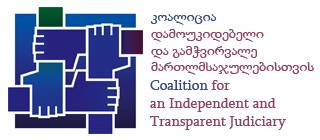For the first time the renewed composition of the High Council of Justice (HCOJ) is appointing judges for life. As of now, the Council has completed interviews of thirty-eight judges who applied for life tenure. Due to the recent legislative amendments it is expected that more than one hundred judges who are currently on probation may apply for life tenure.[1]
Until now, the observation of interviews has demonstrated that the renewed composition of the Council does not impartially handle appointments and the process is mostly superficial.
The monitoring of interviews has revealed a number of problematic issues:
The judges were asked questions of varying complexity. Some of them were treated in a particularly favorable way. The Council did not pose legal questions to candidates who serve as court chairmen, but everyone else had to answer questions on legal issues. The chairmen were mostly asked questions on managerial skills, despite the fact that the Council had to make a decision on appointing them as judges rather than chairmen.
As an example, Vakhtang Mchedlishvili, the Council member selected based on the President’s quota, posed a legal question to one of the candidates who is a Council member and also a court chairman. He asked the candidate to list the absolute rights from the European Convention on Human Rights. This question clearly irritated the majority of the HCOJ members. Some of them tried to give a hint to the candidate, who eventually gave a wrong answer in response to a simple legal question.
It is clear that the candidate did not manage to demonstrate minimal knowledge of the Convention, even though he is a member of the Council and is obliged to assess candidates’ familiarity with the case law of the European Court of Human Rights when making judicial appointments.
Problematic questions and demonstration of biases. During interviews some candidates were asked questions suggesting desirable answers. Also, the Council members often demonstrated biases in relation to certain candidates.
As an example, some Council members clearly demonstrated support for a candidate who recently won a defamation dispute in the first-instance court against a private person. Certain members of the Council applauded this decision as important and precedential. Such an assessment of this particular court decision by the Council members is problematic because the decision is not final, and a preliminary expression of opinions on the ongoing dispute may potentially influence the court.
Unethical behavior of certain Council members in relation to colleagues. During interviews the majority of the Council did not hide their dissatisfaction with the questions asked by two HCOJ members, Vakhtang Mchedlishvili and Nazi Janezashvili. Their attitude to these members was often cynical and marked with aggressive comments. The Council Chair gave each member an opportunity to ask questions. Despite this, certain members often behaved unprofessionally and unethically in relation to their colleagues. Such an attitude is not consistent with the status of an HCOJ member and damages the trust in this institution.
In sum, the observation of interviews demonstrated that the Council has not managed to make judicial appointments in a way that would not lead to doubts of partiality and have not ensured assessment of candidates based on integrity and qualifications. In this context, evaluation of the work of judges, a part of the assessment process which is closed to the public according to the law, becomes even more important.
We call on the High Council of Justice:
to responsibly handle judicial appointments and not appoint judges who do not meet the minimal standards of qualification or/and integrity;
to develop a standardized approach to interviews to ensure equal treatment of all candidates and the types of questions that will allow a merit-based selection of candidates.
The American Chamber of Commerce and the Association of Law Firms of Georgia refrain from expressing their opinion on the issues discussed in the Statement.
News
December 13, 2023
Ethnic minorities outside the peace dialogue
November 6, 2023
‘Peace’ agenda of political parties
Popular
Articles
February 13, 2024




